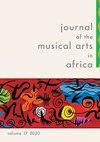Too Late for the Prayers
IF 0.2
4区 艺术学
0 MUSIC
引用次数: 0
Abstract
In his contribution to The Cambridge History of Twentieth-Century Music, Martin Scherzinger (2004:611) writes that African art music of the 1980s and 1990s reclaimed a ‘stake in the making of the world’s musical history’ by recentring the ‘complex intercultural negotiations of sound and meaning’ eschewed in Westerncentred narratives of music. To a certain extent, this still holds true. Much of the scholarship on African music, and especially on the type of intercultural art music to which Scherzinger refers, has emphasised these negotiations in terms of the larger geopolitical and historical frameworks of colonialism (Agawu 2011) and apartheid (Fourie 2019). What gets lost in these larger framings, however, are the smaller, more mundane negotiations of which world histories are aggregates. The new album, Too Late for the Prayers, by the Ugandan composer Justinian Tamusuza and South African Michael Blake presents us with a powerful reason to look to these minor narratives. The composers offer, through this album, an alternative model for the complex intercultural negotiations of African art music which foregrounds not transnational and state apparatuses, but the moving interpersonal exchanges occasioned by friendship. Too Late for the Prayers comprises recordings of four works: ‘Okwanjula Kw’Endere’ (1995) for solo flute and ‘Naakutendanga Emirembe Gyonna’ (2015) for vibraphone and marimba by Tamusuza; and ‘Shoowa Panel’ (2007) for vibraphone and marimba, and ‘Umngqokolo’ (2018) for solo alto flute by Blake. The works for flute and alto flute are performed by Marietjie Pauw1 and the vibraphone and marimba works are played by Duo Infinite (Cherilee Adams and Dylan Tabisher). There is a strong sense that what we hear in this album is a glimpse into an ongoing conversation between ‘two old friends’, as Stephanus Muller puts it in the liner notes, who actively draw inspiration from one another. ‘Naakutendanga’, writes Tamusuza, was ‘inspired by Blake’, and Blake states that in writing ‘Umngqokolo’ he was inspired by Tamusuza’s ‘Okwanjula Kw’Endere’, which he calls ‘the most significant solo flute piece by an African composer’. This type of creative generosity is present throughout the album, evidenced by themes of celebration, a deep caring for indigenous cultural practices and a sense of mutual admiration. This sense of generosity extends to the performances too. Pauw’s rendition of ‘Okwanjula Kw’Endere’ is strikingly visceral and lucid. She draws on a sophisticated timbral palette to colour the祈祷为时已晚
Martin Scherzinger(2004:611)在他对剑桥20世纪音乐史的贡献中写道,20世纪80年代和90年代的非洲艺术音乐通过重新集中在“声音和意义的复杂跨文化谈判”中重新夺回了“世界音乐史的利益”,这在以西方为中心的音乐叙述中被回避了。在某种程度上,这仍然是正确的。许多关于非洲音乐的学术研究,特别是关于Scherzinger提到的跨文化艺术音乐类型的研究,都强调了这些谈判是在殖民主义(Agawu 2011)和种族隔离(Fourie 2019)的更大的地缘政治和历史框架下进行的。然而,在这些更大的框架中,丢失的是更小、更平凡的谈判,世界历史是这些谈判的总和。乌干达作曲家查查丁尼·塔穆苏扎(Justinian Tamusuza)和南非作曲家迈克尔·布莱克(Michael Blake)的新专辑《为时已晚的祈祷》(Too Late for The Prayers)向我们展示了一个强有力的理由,让我们去关注这些次要的叙述。通过这张专辑,作曲家们为非洲艺术音乐复杂的跨文化谈判提供了另一种模式,这种模式的前景不是跨国和国家机器,而是由友谊引起的感人的人际交流。Too Late for the Prayers收录了四首作品的录音:《Okwanjula Kw’endere》(1995年)独奏长笛和《Naakutendanga Emirembe Gyonna》(2015年)Tamusuza为电颤琴和马林巴演奏;《Shoowa Panel》(2007年)为颤音琴和马林巴琴演奏,《Umngqokolo》(2018年)为布莱克独奏中音长笛演奏。长笛和中音长笛的作品由玛丽杰·鲍威演奏,电颤琴和马林巴的作品由无限二重奏(谢丽·亚当斯和迪伦·塔比舍)演奏。有一种强烈的感觉,我们在这张专辑中听到的是对“两个老朋友”之间正在进行的对话的瞥见,正如Stephanus Muller在内页笔记中所说的那样,他们积极地从彼此身上汲取灵感。Tamusuza写道,“Naakutendanga”是“受到Blake的启发”,而Blake表示,在创作“Umngqokolo”时,他的灵感来自Tamusuza的“Okwanjula Kw’endere”,他称之为“非洲作曲家最重要的长笛独奏作品”。这种创造性的慷慨贯穿整张专辑,体现在庆祝的主题、对土著文化习俗的深切关怀和相互钦佩的感觉上。这种慷慨的感觉也延伸到了表演上。保罗对“Okwanjula Kw’endere”的演绎非常发自内心,清晰明了。她用一种复杂的音色调色板给音乐上色
本文章由计算机程序翻译,如有差异,请以英文原文为准。
求助全文
约1分钟内获得全文
求助全文

 求助内容:
求助内容: 应助结果提醒方式:
应助结果提醒方式:


